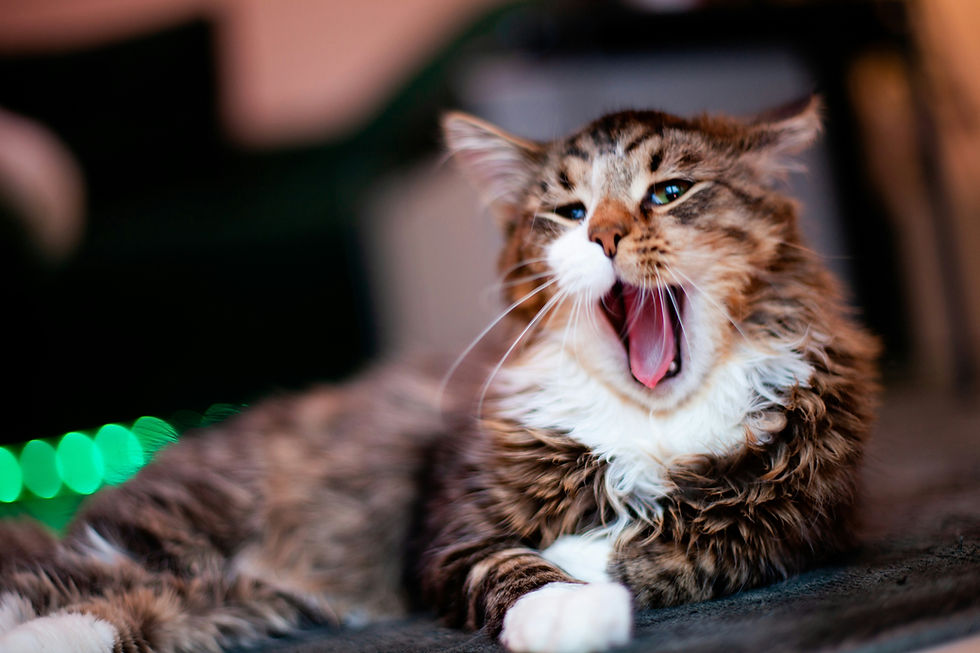Holiday Pet Safety: Keeping Your Furry Friends Safe This Season
- Lance Baltzley, DVM

- Nov 12, 2025
- 4 min read
Updated: Jan 18
The holiday season is a time of warmth, celebration, and togetherness. However, amidst the joy and decorations, this festive period can also present hidden dangers to our furry companions. Luckily, we have put together a comprehensive holiday pet safety guide. This guide will help you keep your pet happy and healthy during this joyful (and potentially hazardous) time of year.
Understanding the Risks
As the holidays approach, it's essential to understand the various risks pets face. These risks can stem from food, decorations, plants, and even the stress of having guests. By being aware of these dangers, you can take proactive steps to ensure your pet's safety.
Toxic Holiday Foods
What’s a feast for us can be a life-threatening danger for pets. Some of our favorite holiday foods are actually toxic to cats and dogs.

Chocolate: Contains theobromine and caffeine, which can cause vomiting, diarrhea, tremors, and seizures.
Grapes and Raisins: Even small amounts can cause kidney failure in dogs.
Xylitol (in sugar-free candy and baked goods): Causes a rapid insulin release leading to hypoglycemia, liver failure, and even death in dogs.
Alcohol: Even small amounts can lead to intoxication and respiratory failure.
Fatty Foods & Bones: Table scraps like turkey skin or ham can lead to pancreatitis, while cooked bones may splinter and cause internal injuries.
Yeast Dough: Can rise in a pet's stomach, causing painful bloating and potentially twisting of the stomach (bloat or GDV), which is a life-threatening emergency. The yeast also ferments, producing alcohol that can lead to alcohol poisoning.
NAH Safety Tip: Politely decline the urge to “treat” your pet to a Christmas dinner. Stick to their regular diet and offer pet-safe treats instead.
Dangerous Decorations
While your pet might find Christmas decorations fascinating, they’re not toys—and many pose real risks.
Tinsel and Ribbons: Particularly tempting to cats, these can cause intestinal blockages if swallowed.
Glass Ornaments: If broken, they can cut paws or be accidentally ingested.
Electric Lights and Cords: Pets that chew wires risk burns or electrocution.
Candles: Curious noses and wagging tails can easily knock them over, causing burns or fires.
Holiday Tree Water: May contain fertilizers, pesticides, or bacteria that can cause vomiting or diarrhea if ingested.
NAH Safety Tip: Keep ornaments and lights out of reach, and opt for shatterproof decorations when possible.
Holiday Plants

Some festive plants can be highly toxic to pets:
Mistletoe: Contains toxins that can cause a range of symptoms in pets, including vomiting, diarrhea, and abdominal pain due to gastrointestinal irritation. In more severe cases, it can affect the heart, leading to a drop in blood pressure, a slowed heart rate, and even collapse.
Poinsettias: Usually cause mild irritation - ingestion can lead to drooling or vomiting.
Holly: Can cause nausea, vomiting, and diarrhea.
Lilies: Extremely toxic to cats - even licking the pollen can cause kidney failure.
NAH Safety Tip: Consider pet-safe alternatives or keep plants far out of reach and off the floor.
Gift Wrap and Toys
Wrapping paper, bows, and toys with small parts are easy to overlook, but pose real threats:
Plastic packaging and wrapping: Can cause choking or an intestinal blockage when eaten.
Batteries and magnets: Swallowing batteries or magnets is a medical emergency. Batteries can cause severe internal burns and tissue damage as the battery discharges, while magnets can attract each other across intestinal walls - leading to tissue necrosis, perforation, and peritonitis.
Toys with small parts: Can become lodged in the throat or intestines if chewed and swallowed.
NAH Safety Tip: Clean up wrapping paper quickly after gifts are opened, and supervise your pet around new toys.
Guests and Stress
During the holidays, pets can experience increased stress due to a combination of factors. The influx of visitors, changes in their daily routine, and the general increase in household noise can be overwhelming. These disruptions can lead to anxiety, hiding behaviors, or even attempts to escape from the home.

Open doors: During holiday gatherings, with many people coming and going, it's easy for a door to be left ajar. Pets, especially those who are curious or prone to bolting, can quickly slip out unnoticed, putting them at risk.
Stress-induced illness: The hustle and bustle of the holidays can be very stressful for pets. This stress can manifest as gastrointestinal upset, such as vomiting or diarrhea, or behavioral issues like increased anxiety or aggression.
Unknown guests feeding treats: Well-meaning visitors may not be aware of which human foods are toxic or unhealthy for pets. Even small amounts of certain foods can cause significant health problems for your furry friends.
NAH Safety Tip: Provide a quiet, secure space where your pet can retreat, and inform guests not to feed them when they are out and socializing.
When to Call the Vet
Contact your veterinarian or an emergency animal hospital immediately if your pet:
Ingests something toxic
Vomits repeatedly or has severe diarrhea
Seems lethargic or disoriented
Has difficulty breathing
Shows signs of pain or discomfort
The holiday season should be a time of comfort and joy for the whole family, including your pets. With a bit of preparation and vigilance, you can keep the holidays merry, bright, and safe for your furry friends. If you’re ever unsure whether something is safe for your pet, a quick call to your vet or one of the below pet poison helplines could save you both a lot of heartache.
Pet Poison Helpline: (855) 764-7661
ASPCA Pet Poison Control: (888) 426-4435
From all of us here at Newberry Animal Hospital, we wish you a safe and happy holiday season!
Having a pet emergency when our hospitals are closed for the holidays? Contact one of our local pet emergency hospitals to get your furry friend immediate care:
Community Care Veterinary Specialists: (352) 225-3501
UF Small Animal Hospital: (352) 392-2235
Urgent Vet Gainesville: (352) 374-0040




